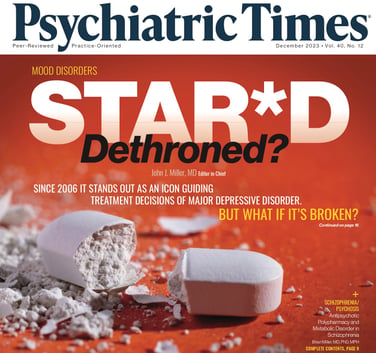January 22, 2024 08:37 AM

A re-evaluation of the influential STAR*D study of antidepressants has exposed it as a fraud, now recognized by the psychiatric community. Dr. Sparks was right.
Something miraculous has happened. After nearly two decades of promulgating lies and unduly influencing antidepressant prescription practices to increase from 8 to 12% of Americans taking them, the STAR*D is finally being recognized for the fraud that it is by the psychiatric community. Finally! Better late than never, I guess. Although several scholars reported (including Dr. Jacqueline Sparks and me) the outright lies reported in this unbelievably unethical example of science fiction, one group of researchers led by Edmund Pigott not only got the ball rolling but also continued their efforts to expose this egregious study that was purely marketing masquerading as fact. Pigott and colleagues first published a scathing critique in 2010 detailing the protocol violations that the STAR*D investigators had employed to inflate the cumulative remission rate. Other than scholars not associated with the pharmaceutical industry, no one in the psychiatric community paid any attention, even after Pigott and renowned antidepressant researcher Irving Kirsch published a condemning RIAT reanalysis of the study findings this past July in BMJ.
The Miracle

But then the miracle happened. Psychiatric Times reported on Pigott’s RIAT re-analysis in its December issue. John Miller, editor-in-chief of Psychiatric Times, suggested:
For us in psychiatry, if the BMJ authors are correct, this is a huge setback, as all of the publications and policy decisions based on the STAR*D findings that became clinical dogma since 2006 will need to be reviewed, revisited, and possibly retracted.
The reanalysis tells of drug treatment that failed to help two-thirds of patients, even after multiple drugs and drug combinations had been tried. The study concluded:
In contrast to the STAR*D-reported 67% cumulative remission rate after up to four antidepressant treatment trials, the rate was 35.0% when using the protocol-stipulated HRSD and inclusion in data analysis criteria.
Perhaps more telling is that after a year of continuation treatment following remission, their data show that of the 2876 patients (some critics argue for using the number who started the trial, or 4140 participants) who started Level I, only 108 (4%) had a sustained remission — all the other patients either dropped out or relapsed.
The Scandal
I encourage you to read more about this psychiatric scandal:
- The original Pigott et al (2010) study,
- the formal 2023 re-analysis,
- Robert Whitaker’s article that chronicles the entire debacle, including the New York Times article promoting the lies of STAR*D,
- My blog before the Whitaker article that exposed the NYT piece and the STAR*D,
- and finally, the Psychiatric Times article.
I Had to Give It Up
Taking this despicable situation to a personal level, this study and its aftermath of lies and complicity significantly contributed to letting go of this aspect of my scholarship. My partner in drug research debunking crime, the inimitable Dr. Jacqueline Sparks, never gave up. But that was at least partially my fault--I created a monster, albeit a kind and gentle force of nature. Jackie, as her friends called her, took a graduate course from me in 1999 called, “The Efficacy of Psychiatric Drugs: Separating Science Fiction from Fact.” In the course, I presented the scientific pitfalls of drug research and the ubiquity of pharmaceutical company influence, using the studies supporting SSRIs with adolescents as deplorable examples. From then on, Jackie was a tornado of critical analysis and dissection of drug research, among her other talents regarding PCOMS and social justice.
Jackie is pictured here with her first published article about the lies of drug research “Exposing the Mythmakers.”
We published many articles and chapters, presented nationally and internationally, wrote letters to journals exposing faulty conclusions, bogus science, and unreported conflicts of interest, and evaluated and eviscerated every new study claiming drug efficacy. Jackie was brilliant at digging into articles, the details of the methodology and the measures, and the minutia of the tables (truth is always in the tables). And of course, she was a gifted writer.
Perhaps the most widely read critique was our chapter (with David Cohen and David Antonucio) about drug efficacy and the fatal flaws of psychiatric drug research (Sparks et al., 2010) in the best-selling second edition of The Heart and Soul of Change (Duncan et al., 2010). Our review included the misrepresentation of the STAR*D data which incidentally predated the Pigott et al. (2010) article. But their analysis was far more detailed and importantly, they stayed with it and ultimately hit pay dirt, at least regarding breaking the silence of the psychiatric community.
Jackie Was Right
As I said, the STAR*D and its lies were the final straw for me. Despite the low remission rates and drug intolerability, the exposure of the deception involved in reporting the results, and the seemingly transparent marketing spins of the data, it made no difference. If a lie is repeated enough and supported by a lucrative, for-profit industry as well as medical authority and credible media, it becomes the truth, when presented either intentionally or inadvertently as in the NYT piece. The constant talking point and marketing spin become the 67% cumulative remission rate. All the scholarship, all the critical analyses, and all the exposés did nothing to change anything, of course until now. But will it make a difference? I always return to my pessimistic conclusion: Good marketing overcomes bad data every single day.
This depressing conclusion led me to give up my time-swallowing efforts to provide an alternative voice based on real science, especially about kids. Instead, I stayed up with the research but focused my professional efforts elsewhere, on encouraging the field in a more client-directed (the common factors) and outcome-informed direction (PCOMS). I decided that these efforts could positively influence practice whereas my efforts regarding the risks and benefits of psychotropics would not. While not publishing past 2013 with Jackie about psychotropics, we continued our collaboration about PCOMS and client privilege.
But Jackie and Pigott et al. never gave up. Thank goodness. Pigott et al. finally prevailed as noted in the Psychiatric Times article. Jackie became editor of the Journal, Ethical Human Psychology and Psychiatry and continued her efforts. Jackie was right about the STAR*D and most other things.





.png)


.png)